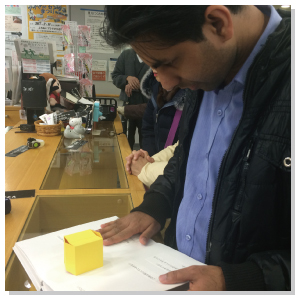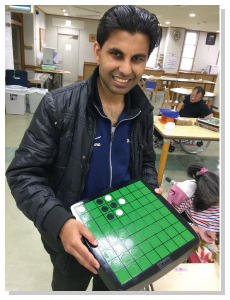- HOME
- Alumni News
- Sankha Hasintha Liyanaarachchige Don (participated in the 18th Program)
- Sankha's Final Report
Sankha's Final Report
Final Report
The invaluable experiences molded my future beyond the horizon.
Sri Lanka and Japan have enjoyed a very close relationship since ancient times. Most of the Sri Lankans believe that Japan is a country of very honest and skillful people. So before I came to Japan, I had a positive impression towards Japan.
I became a low vision person at a very young age of 16. At that time, I was a high school student and faced a lot of difficulties due to this poor eye condition. But I had enough courage and strength to face these challenges and managed to enter the best university in Sri Lanka, the University of Colombo. Today I work as an English teacher at a Junior high school where both students with and without disabilities study together. Because of my own experience I always feel the need to assist students for their education and I always wish to become a leader in the field of education.
Meanwhile I came to know about the Duskin leadership program and last year, I was granted an opportunity to visit Japan as one of the 18th Duskin leadership trainees.

Japanese Classes
The first and main challenge for all trainees is learning the Japanese language. We started Japanese classes with the support of extraordinary instructors. We were all amazed that, within a short period of three months, we could improve Japanese skills. I give my sincere thanks to all the language instructors.
Main training program
Our individual training is the longest and the main part of this training program. It was structured and planned according to our personal interests and future goals. My main theme was to study Japanese educational system, inclusive education and education for people with visual impairment in Japan. I visited a wide range of public institutions, rehabilitation centers, special schools, inclusive schools, student support centers in universities and libraries, national and regional institutions of the government, and NGOs and NPOs across Japan working for the amelioration of the plight of persons with disabilities in the country.
I treasured the opportunity of getting theoretical knowledge and practical experiences related to different aspects of disabilities in Japan. My main themes were education, DAISY, Braille libraries, sports and barrier-free environment for people with disabilities.
1. Education
I visited the first blind school in Japan, Kyoto School for the Blind, and Tsukuba School for the Visually Impaired where Japanese Braille was invented for the first time in history.
One of the unique features of Japanese education system is the good management of physical environment and physical resources. Second, when students move up from one educational stage to an upper stage there is no time gap or waiting time. For example, when students graduate from high school in March, they start universities right away in April of the same year. The third unique feature is that apart from their academic curriculum, students engage in extracurricular activities enthusiastically.
Unfortunately, in Japanese special schools there are less numbers of students. I observed there were only one or two students in classrooms. So, it strongly affects students’ peer interactions and extracurricular activities. However, thanks to skillful and talented teachers, the students actively interact with them. I also participated chemistry, science, mathematics and geography lessons for classroom observation and enjoyed a great opportunity of engaging in a chemistry experiment lesson. I was amazed by how creatively teachers and educational authorities design teaching materials, learning aids and textbooks that are suitable and accessible for students with visual impairment.
As illustrated above, I gathered priceless experiences related to the Japanese educational system and I strongly believe I can generate new creative ideas and apply the benefits to Sri Lankan students, teachers, educators and society.
2. DAISY and Braille libraries
To ensure the rights of information accessibility, many responsible organizations conduct many activities. I attended a course of technical training for creating DAISY books at ATDO. DAISY books are not only beneficial for visually impaired persons, but also for many of those with disabilities related to printed materials.
I also visited several Braille libraries to observe their resource facilities and management. I found two services which are suitable for Sri Lankan context.
1) Book loan service
When users with visual impairments want to lend books, they make a call to a Braille library. For them, Braille books and talking books are loaned out by post free of charge.
2) Reading service (face-to-face service)
The reading service is provided by volunteers. People who want the reading service are to contact the library. This way, people with visual disabilities can read the books they want, and volunteers gain new knowledge by reading out the books. It is a win-win activity for both service users and providers.
I would like to introduce and lay out these two services in Sri Lanka.
3. Sports
Experiences related to sports also gave me an insight to think about disability issues from a new point of view. In the very first days after I came to Japan I tried riding a tandem bicycle. It was an inclusive sport, both disabled and non-disabled person participated. Once I rode the tandem bicycle I was very happy and thought about it again and again afterwards. I understood how we could gain big results with a small effort or changes we make. The same concept can be applied to education, transportation, employment etc., to make our environment barrier-free and give equal opportunities to everyone including disabled people. So, I believe sport is the bridge to connect disabled and non-disabled people to create an inclusive society? I engaged in several sport activities such as running, swimming, skiing, table tennis, volleyball etc. I need to introduce them to my country as soon as possible.
4. Barrier-free environment
As an outsider, I salute to Japanese people including disabled people for having created such an amazing barrier-free environment in Japan. Most of the buildings, transportations and products are accessible and barrier-free for persons with disabilities. Now Japan applies universal design to every construction and product. The Japanese disability movement to create a barrier-free environment started decades back. It is ongoing and getting stronger day by day. I need to make contributions myself to construct a barrier-free environment in Sri Lanka.
As mentioned, I studied a wide range of disability-related elements in Japan. In the Japanese disability field, there are many positive aspects and it is getting better by the day. But we still cannot say Japanese society is inclusive, because in some areas there is still a long way to go. Especially employment, and education are still in a special mode. Also, Japan has specific issues unique to the country’s situation which other countries do not experience. The increasing elderly population and decreasing young population are the most critical social problems, affecting every aspect of Japanese society. We can observe it directly affecting people with disabilities too.
Another important fact is that the Japanese health and medical care is very well-developed. As a result, even babies born with very severe disabilities can survive. In the past. These children could not live very long. Today, with intensive medical care, they can live. On the other hand, people are living longer in Japan. So disabled people’s population in Japan is increasing, meaning more elderly disabled people, as well as children with severe multiple disabilities. So, these are current challenges Japanese society is facing.
Home stay and cultural experiences
I had a lot of experience related to distinctive Japanese culture. I had a very pleasant time spending the New Year vacation with two families. Both families gave me full affection, warmth and protection during my stay with them. I became their own family member and this bond will last for the rest of my life. I had a very nice time in Kumamoto with Yasuda san’s family celebrating the Japanese New Year together. I will especially never forget the experience of visiting hot springs in Kumamoto and other areas of Japan.
In Kyoto, I also had a very pleasant time with Takeshita san’s family. I had an opportunity to wear a beautiful Japanese Kimono. Also, I visited a lot of beautiful temples and shrines in Kyoto, the Shinkansen Museum and I was lucky to see the amazing creation “the first Shinkansen” at this Museum
Both families treated me to delicious traditional Japanese food. We also had very fruitful discussions, which put my thinking beyond my usual frame of thoughts. I give my heartfelt warm thanks for these two families for giving their sincere affection to me.
My dream
I wish to see my country turning into an inclusive society where everyone can enjoy equal rights and opportunities including persons with disabilities. To make this dream come true I wish to make contributions by doing the following.
Before I came to Japan, I was giving computer training to visually impaired soldiers in Sri Lanka. I wish to continue onto the next stage of this program, giving training to the rest of the soldiers. Also, I need to develop quality education for visually impaired children. For this purpose, I plan to create learning materials, specially for subjects like geography, mathematics and science. Then I need to provide more sport opportunities for people with disabilities. I would like to introduce inclusive sports. I will also increase accessible information by creating DAISY books. I also wish to introduce loaning and one-on-one reading services to Sri Lankan libraries. I will actively get involved in disability movement to create a barrier-free environment. Finally, I wish to continue my higher studies with the hope of becoming a university lecturer.
Last but not least, I would like to give my heartfelt, warm thanks, to all the members of staff at the Duskin AINOWA Foundation, Japanese Society for Rehabilitation of Persons with Disabilities and Toyama Sunrise, all the teachers of the Japanese language classes, all the instructors of swimming and ski training, and everyone who welcomed me kindly at various training locations; volunteers and all my Japanese friends who made my stay a happy and fruitful one in Japan. Thank you so much.





